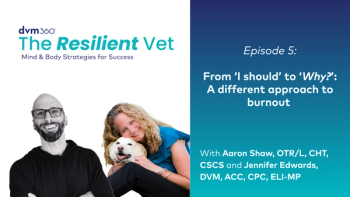
5 steps to lower stressand how mindfulness can help veterinarians
Clear mind, lower stress and better emotional resilience are the goals. Learn more about mindfulness and how to live more in the moment and less in a regretful past or panicked future.
Editor's note: Former practice owner and now management and life coach Dr. Steve Noonan will share self-care tips for veterinarians and veterinary team members each month here on dvm360.com.
Recent initiatives to increase awareness of stress and mental health issues among members of our profession are well-founded. Studies show a suicide rate amongst veterinarians approaching seven times the general population and high levels of anxiety and depression. I've worked with real veterinarians who have experienced what the statistics are telling us, and I believe the time has come to educate veterinarians about the wide range of proven self-care techniques that are available.
What mindfulness is
This article will focus on mindfulness. To be mindful is to be in the present moment, on purpose, without judgment. The present moment may be the only real moment we ever have. However, rather than appreciating the present, we often find ourselves reliving the past or anticipating the future with painful regret and paralyzing worry. As a result, living outside the present can be a great source of anxiety. The irony is, we create suffering when we think about an event long past or one that may never come.
There are many ways to hone mindfulness, but all are intended to cultivate present moment awareness. One pioneer of mindfulness-based stress reduction-Jon Kabat-Zinn, PhD-began teaching an eight-week course on the topic more than 30 years ago. His participants were patients at the University of Massachusetts Medical School with mental health or chronic pain issues that weren't responding to standard treatment. That course is still taught today, focusing on basic relaxation and breathing techniques, meditation and simple yoga, along with such daily homework as a gratitude journal and a positive events log.
Participants in these courses were followed and compared to control groups and scored significantly better on standardized psychological tests with lower pain scores. In every measure there was an increase in quality of life. This work was published and mindfulness-based stress reduction (MBSR) started to gain traction as another tool to manage mental health.
How mindfulness works
Today, tens of thousands have taken MBSR training worldwide. There are more than 1,300 scientific papers chronicling the benefits to mental health, physical health and mental acuity. Participants in MBSR courses have also seen a reduction in compassion fatigue, reporting more empathy and less distress from interactions surrounding death.
There are also remarkable findings from Amishi Jha, MD, a neuroscientist working with the United States Marine Corps. Mindfulness-based stress reduction training was introduced in boot camp to troops prior to deployment in Iraq. These participants had better memory, better task performance and better decision-making under stress as compared with the controls-benefits for soldiers as well as medical practitioners. Even more compelling is that MBSR participants had a higher likelihood of returning home alive and a lower incidence and severity of post-traumatic stress disorder (PTSD).
I believe this is of particular significance to veterinarians. There is a paucity of data, yet few will argue that veterinarians are confronted with horrific situations under which they have no control: loud and unrelenting noises, unpredictably dangerous animals, bloodshed and death-all triggers for PTSD. The disorder is linked with higher levels of anxiety, insomnia, depression and suicide.
Currently, MBSR is part of the curriculum at more than 100 North American medical schools. It's also taught as an elective at the Western College of Veterinary Medicine at the University of Saskatoon by Dr. Patricia Dowling and at the University of Tennessee's veterinary college by a nonveterinarian. Mindfulness training has a tremendous potential to improve the quality of life for veterinarians-including you.
5 ways to put mindfulness to work for you right now
Try one of more of these breathing and mindfulness techniques at work. Their regular use helps can help you clear your mind and lower your stress.
1. Slow your breathing. Before entering an exam room to see a client and/or patient, stop and take five slow cycles of respiration (five seconds to breathe in, five seconds to breathe out), feeling the air enter and leave your body.
2. Do a little stretching. Got the breathing down? With closed eyes, reach slowly to the sky while breathing in for five seconds then slowly return your arms to your side and exhale. Repeat five times.
3. Feed your focus. Try eating your lunch as slowly as you can, savoring every bite and body sensation. You may be surprised at the flavor and your sensation of fullness.
4. Study the simple. Choose a random object in your immediate environment such as a pen, a flower or your stethoscope and observe it very carefully for 60 seconds. See what you can observe that you may never have seen before.
5. Walk the walk. Take a slow 10-minute walk and synchronize your inspirations and expirations with your footfalls. This can be amazingly relaxing.
Dr. Steve Noonan, CPCC, is a veterinarian, management consultant, counsellor, mindfulness instructor, and professional life coach living in Guelph.
Newsletter
From exam room tips to practice management insights, get trusted veterinary news delivered straight to your inbox—subscribe to dvm360.




